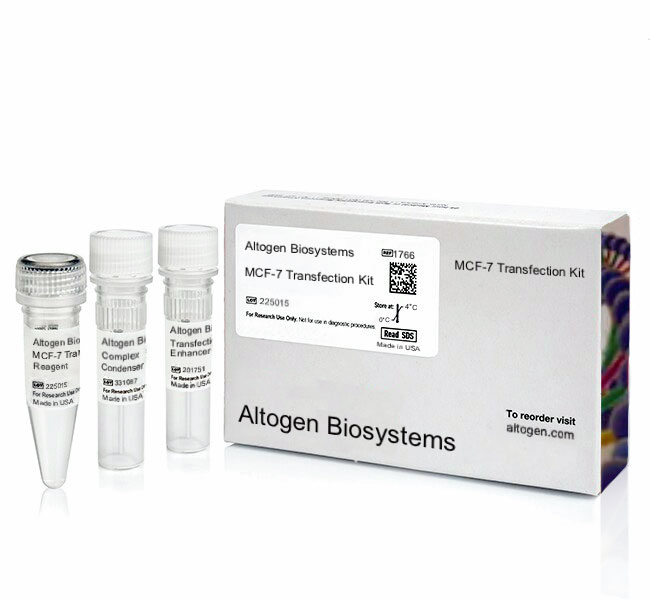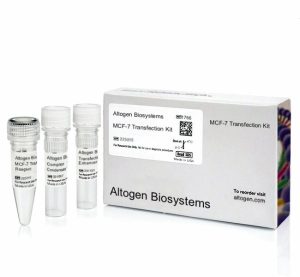Description
Purchase Orders: Click “Add to Cart” button to order, then email PO to orders@altogen.com.
Product Availability: In Stock.
Transfection Reagent for MCF-7 Cells (Breast Cancer Cells, HTB-22)
- Proprietary cationic lipid formulation
-
High transfection efficiency of small RNA (siRNA, shRNA, miRNA), mRNA, and plasmid DNA
-
Effective and robust delivery into MCF7 cells
- Work in the presence of serum
-
A proven reagent for establishing stable cell lines
-
Optimized transfection protocols are adapted for use with both standard & reverse transfection methods
-
Download MCF-7 transfection protocol: [PDF]
- Download MCF7 CRISPR/Cas9 transfection protocol: [PDF]
-
Download PowerPoint presentation for MCF-7 cells transfection kit: [PPT]
- UPC/GTIN/EAN: 860002089785
-
Brand: ALTOGEN®, developed and manufactured by Altogen Biosystems
Transfection Efficiency:
Reagent exhibits at least 85% transfection efficiency of siRNA delivery. Transfection efficiency was determined by qRT-PCR.
Product Description:
Pre-optimized transfection kit for high transfection efficiency of MCF7 cell line, a human breast adenocarcinoma cells. Transfection reagent supplemented by complex condenser and transfection enhancer reagents.
Transfection Protocol and SDS:
Download Altogen Biosystems MCF-7 Transfection Protocol: [PDF]
Download SDS: [PDF]
MCF-7 Cell Line:
MCF7 is a human breast adenocarcinoma cell line that was originally derived from the breast tumor of a 69-year-old woman with metastatic breast cancer. These cells have been widely used as a model system for studying various aspects of breast cancer biology, including the molecular mechanisms underlying tumor development and progression, and the identification of potential therapeutic targets for the treatment of breast cancer. MCF7 cells have several properties that make them useful for research. They are relatively easy to culture in the laboratory and can be grown in large quantities, also MCF-7 cells express markers of breast cancer, such as estrogen and progesterone receptors, and exhibit several features characteristic of breast cancer, including uncontrolled proliferation, invasion, and metastasis. Thirdly, they respond to various stimuli, such as growth factors and hormones, making them a useful model system for studying the effects of these factors on breast cancer cell growth and survival.
Breast cancer remains the second primary cause of cancer deaths in females as well as the most commonly diagnosed cancer in women in the United States. According to the National Breast Cancer Foundation, every year more than 252,000 women in the country are diagnosed with breast cancer and over 40,000 will die. The MCF-7 cell line was derived from a 69-year-old Caucasian female in 1970 and is the most extensively studied and frequently used of all the human breast cancer cell lines. MCF-7 stands for Michigan Cancer Foundation – 7 (referring to the institute where in 1973 the cell line was discovered by Soule and associates). This cell line is a perfect model to study the pathway of malignant progression. Previous to MCF-7, no mammary cell line could live longer than a few months. MCF-7 has multiple characteristics of differentiated mammary epithelium, including the capability of forming domes and the ability to process estradiol via cytoplasmic estrogen receptors. TNF alpha inhibits the growth of MCF-7 breast cancer cells. Applying anti-estrogens can transform the secretion of insulin-like growth factor binding proteins. Cells from the MCF7 breast cancer cell line are widely regarded as a near perfect model to examine the growth of malignant tumors. Altogen Biosystems produces pre-optimized high-efficiency transfection reagent kits for the MCF-7 breast cancer cell line.
Mutations:
| PIK3CA | 5290 | 37 | 3 | 178936091 | 178936091 | Missense_Mutation | SNP | G | A |
| IQGAP2 | 10788 | 37 | 5 | 75932998 | 75932998 | Silent | SNP | C | T |
| UNC79 | 57578 | 37 | 14 | 94079386 | 94079386 | Missense_Mutation | SNP | G | A |
| OR6B2 | 389090 | 37 | 2 | 240969550 | 240969550 | Silent | SNP | C | T |
| DAPK1 | 1612 | 37 | 9 | 90321379 | 90321379 | Silent | SNP | C | T |
| ATP10A | 57194 | 37 | 15 | 25926003 | 25926003 | Missense_Mutation | SNP | G | A |
| KLHL32 | 114792 | 37 | 6 | 97561953 | 97561953 | Missense_Mutation | SNP | C | T |
| HES5 | 388585 | 37 | 1 | 2461313 | 2461313 | Missense_Mutation | SNP | C | T |
| PRDM16 | 63976 | 37 | 1 | 3329264 | 3329264 | Missense_Mutation | SNP | G | A |
| ESPN | 83715 | 37 | 1 | 6505885 | 6505885 | Missense_Mutation | SNP | C | A |
| PEX14 | 5195 | 37 | 1 | 10689704 | 10689704 | Missense_Mutation | SNP | C | T |
| SRRM1 | 10250 | 37 | 1 | 24989227 | 24989227 | Silent | SNP | G | A |
Data:
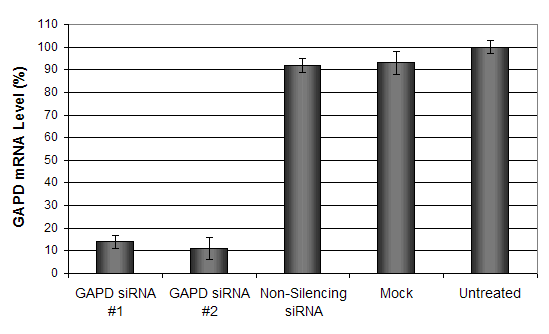
Figure 1. GAPD mRNA levels were quantified using real-time qRT-PCR in the MCF7 cells transfected with siRNAs targeting GAPD or non-silencing siRNA. Forty-eight hours post-transfection, the cells were harvested and analyzed by real-time qRT-PCR for GAPDH mRNA expression levels. Data were normalized against the 18S rRNA signal. Control samples were either mock-transfected or untreated. Values are normalized to untreated sample. Data are means ± SD (n=3).
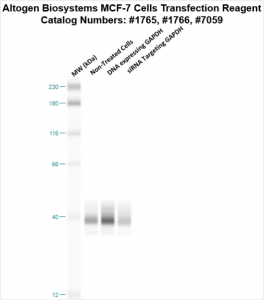
Figure 2. Protein expression of GAPDH in MCF7 cells. DNA plasmid expressing GAPDH or siRNA targeting GAPDH were transfected into MCF7 cells following Altogen Biosystems transfection protocol. At 72 hours post-transfection the cells were analyzed by Western Blot for protein expression levels (normalized by total protein, 10 µg of total protein loaded per each well). Untreated cells used as a negative control.
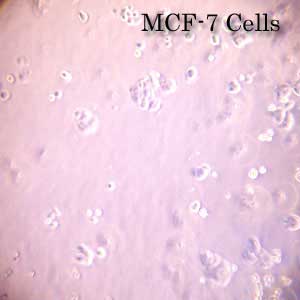
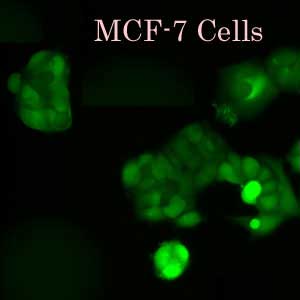
Selected MCF7 transfection reagent citation references:
- BMC Cancer. (2017) 17: 169. Altering calcium influx for selective destruction of breast tumor. Yu et al [PDF]
- J Transl Med. 2010 15;8:133. Prevention of hyperglycemia-induced myocardial apoptosis … Zhang et al [PDF]
Altogen Biosystems manufacturers over 100 pre-optimized in vitro transfection kits for cancer cell lines and primary cells, elecroporation products, and tissue-targeted in vivo delivery reagents for life science research. Advanced formulation of reagents and optimized transfection protocols provide efficient intracellular delivery of protein, DNA, mRNA, shRNA and siRNA molecules. Read more about transfection technology at Altogen’s Transfection Resource. Altogen Labs provides safety and efficacy preclinical research services. GLP-compliant studies for IND applications, and drug development, including over 90 in-house validated xenograft models, safety toxicology, etc (visit AltogenLabs.com).
Volume Options:
- 0.5 ml (Catalog #1765)
- 1.5 ml (Catalog #1766)
- 1.5 ml CRISPR (Catalog #2169)
- 8.0 ml (Catalog #7059)
Purchase Orders: Click “Add to Cart” button to order, then email PO to orders@altogen.com.
Product Availability: In Stock.





